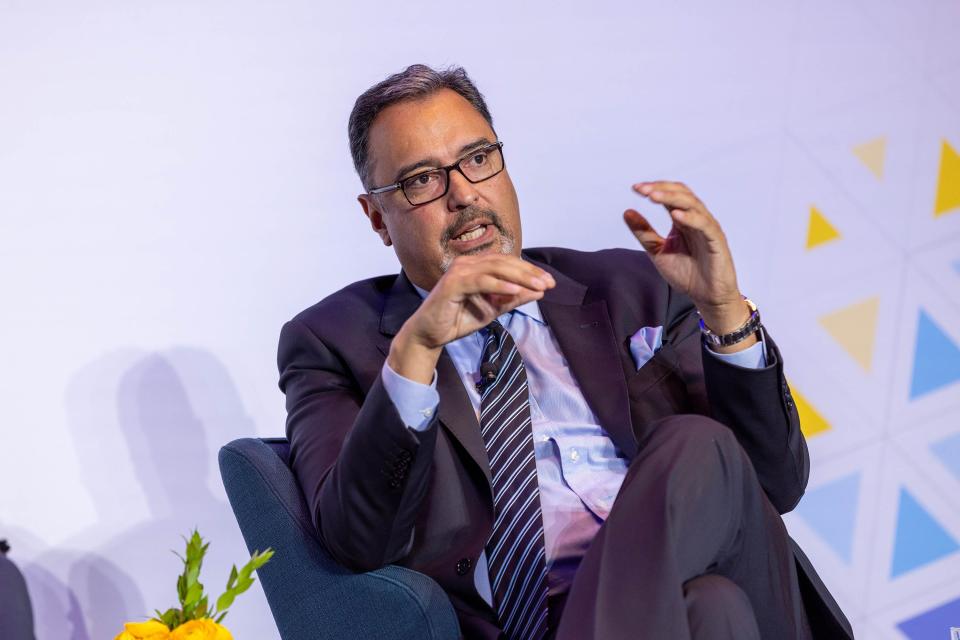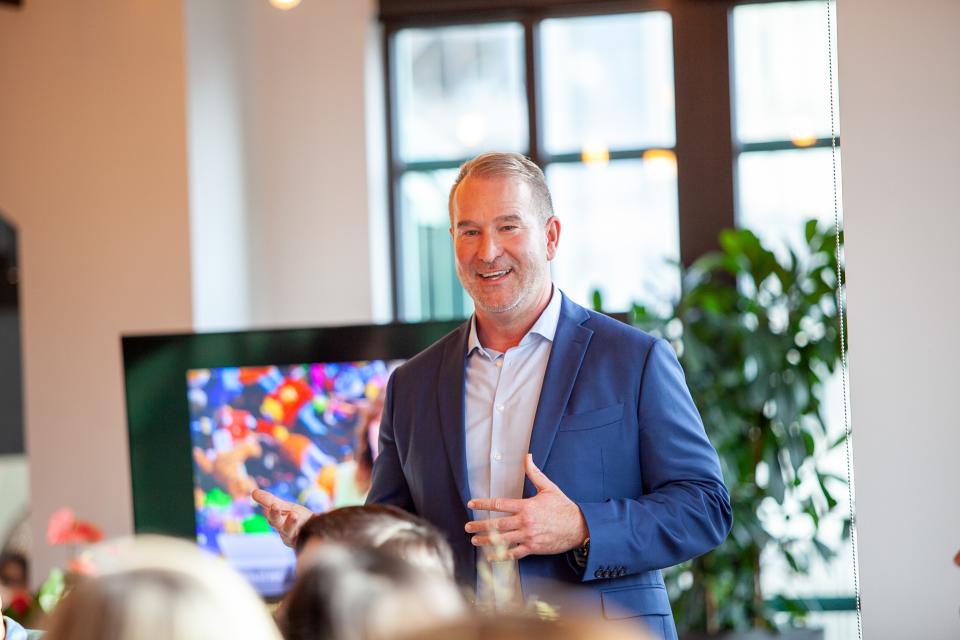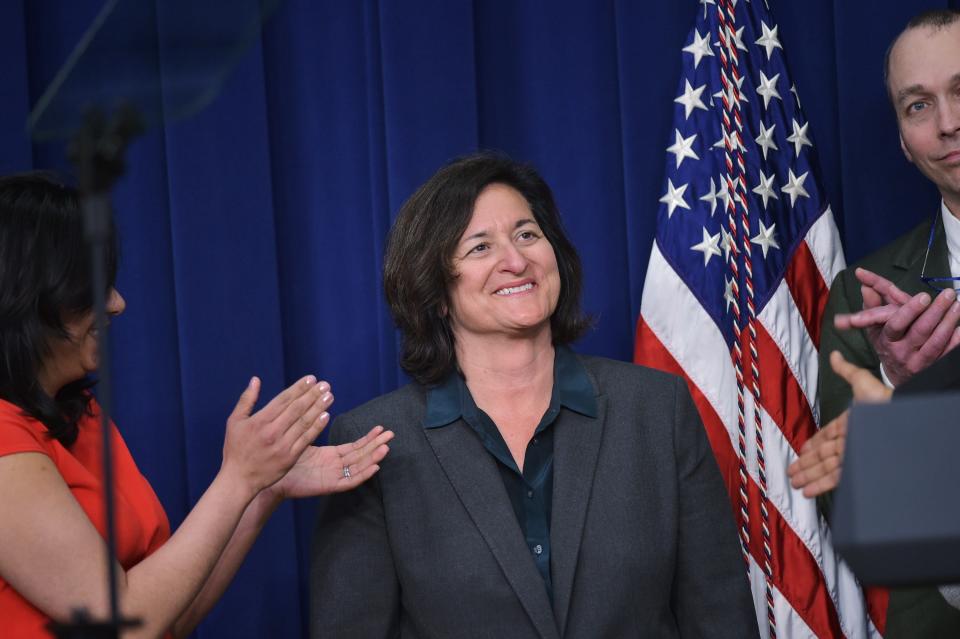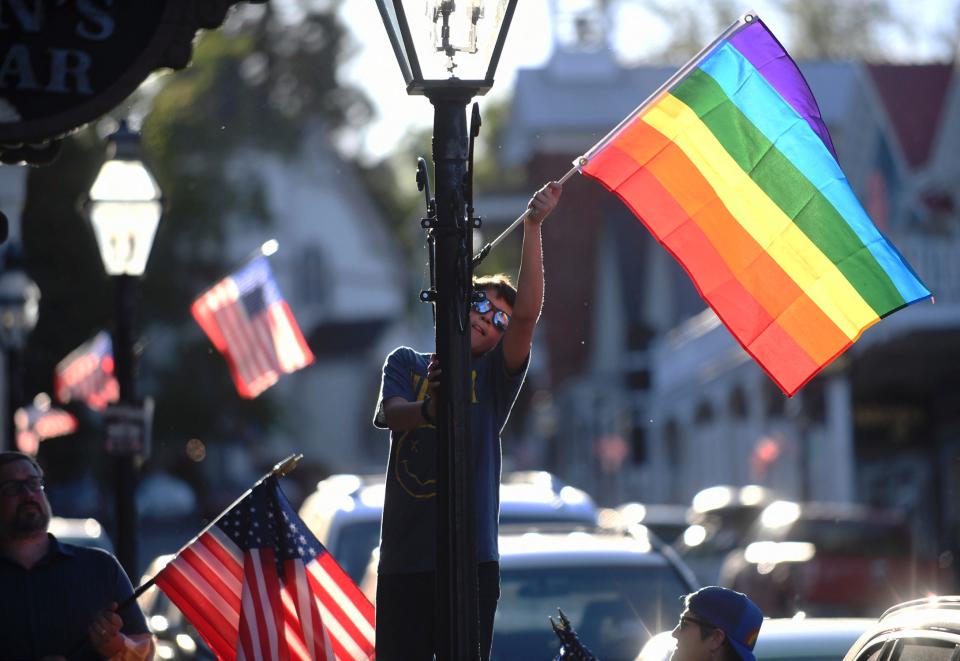Openly gay in the boardroom: Why so few LGBTQ executives lead America's largest companies
Edison International board member Michael Camuñez was going over the proxy statement for a coming shareholder meeting in 2018 when he noticed that the utility holding company listed the race, ethnicity and gender of its directors, but not their sexual orientation or gender identity.
He floated the idea of adding that information to the annual regulatory filing. His fellow board members quickly agreed. Today, Camuñez, one of two Hispanic board members, is also identified as part of the lesbian, gay, bisexual, transgender and queer community.
From the Me Too movement to the murder of George Floyd, pressure has increased on overwhelmingly white and male corporate boards to address historic racial and gender inequities. Far less attention has been paid to the scarcity of LGBTQ directors.

Few companies encourage self-reporting or track LGBTQ representation at the board level. And, despite the flashy rainbow-colored celebrations companies put on each year during Pride Month, there are few openly gay leaders – and even fewer gay people of color – serving on corporate boards, according to a USA TODAY analysis of information collected by data firm DiversIQ.
While all the companies in the S&P 500 disclose at least some racial, ethnic or gender data about board members, just 128 disclose whether they have directors who identify as LGBTQ, the analysis found.
So, even as studies link diverse boards to better business outcomes and returns for investors, the same insular corporate culture that for decades kept women and people of color out of the boardroom is making it more difficult for LGBTQ executives to reach the top.
“I’m not just Latino, I’m openly gay. I think it’s important that our employees see that, that our ratepayers see that, and that our shareholders see that,” said Camuñez, president and CEO of consulting firm Monarch Global Strategies. “Frankly, I think it sends an important message to the rest of corporate America that LGTBQ directors are here, need to be accounted for and should be represented.”
Openly gay leaders from Apple's Tim Cook to Macy's Jeff Gennette
Seats on corporate boards are sought-after part-time positions overseeing and advising company leadership that confer prestige, power and a big paycheck. They are usually filled by seasoned executives.
In recent years, that has included prominent figures who are openly gay, from Apple’s Tim Cook, who sits on the boards of Apple and Nike, to Dow’s Jim Fitterling, who sits on the boards of Dow and 3M. Both publicly acknowledged they were gay in 2014.
Land O Lakes’ Beth Ford, who is on the board of BlackRock, became the first openly gay female CEO of a Fortune 500 company in 2018.
Macy's 13-member board has three gay directors, including CEO Jeff Gennette, its chairman.
"We are committed to a workforce that reflects the communities we operate in at all levels, from the shop floor to the boardroom," Gennette told USA TODAY in an email.
Still, the ranks of LGBTQ leaders are sparse. In 2021, openly gay directors held 26 of the board seats in the Fortune 500, an increase of four from the prior year.

Of the 128 S&P 500 companies that disclose LGBTQ representation on boards, just 46 had one LGBTQ member and five had two. Most had none at all, the USA TODAY analysis of 2022 data shows.
Only 34 companies identify individual board members who are LGBTQ. Even fewer – just 26 – publicly share how many employees self-identify as LGTBQ.

“LGBTQ has fallen off the radar,” said Sarah Kate Ellis, president and CEO of advocacy organization GLAAD. “Representation matters dearly and deeply. If people are not seeing themselves in CEO spots or on boards, they are not going to even think that is an option for them.”
That’s something Todd Sears is determined to change.
As founder and CEO of Out Leadership, he has waged an eight-year campaign to get companies to explicitly recognize sexual orientation and gender identity in their definition of board diversity.
Out Leadership built a database of self-identified LGBTQ leaders who are interested in serving on boards. It worked with Nasdaq to include LGBTQ in a new reporting rule that exchange-listed companies meet a minimum target of two diverse board members or explain in writing why they don’t.
It lobbied for LGBTQ people to be included in a California law mandating one diverse board member on the boards of publicly traded companies headquartered in the state. That law was recently struck down in the courts.
Out Leadership also urged large public institutional investors like CalPERS to require that companies they invest in include LGBTQ people in their definition of board diversity.
Sears has data on his side. A 2020 Credit Suisse survey found that LGBT-friendly companies outperform less inclusive companies.
“We are gaining momentum, but we obviously have a long way to go,” Sears said.

Just 41 Fortune 1,000 companies have board diversity guidelines that specifically mention sexual orientation and gender identity, double the number from eight years ago, according to Out Leadership.
“There’s been a level of discomfort in boardrooms to even ask the question,” said Matt Fust, a finance executive, board member and senior adviser to Out Leadership on boardroom diversity. “When I started doing this work, there was a sense of: ‘Oh, I couldn’t possibly ask if a particular director was gay or lesbian.’”
Why LGBTQ representation matters in the boardroom
Rose Marcario, the former CEO of Patagonia, sits on the board of Rivian. She says she hid her sexual orientation until 1999, when she joined Silicon Valley firm General Magic as its chief financial officer.
“One of my revelations was that I wanted to bring my whole self to that job and that included my life as a gay woman,” she said. “Once I did that, I never looked back.”

On a recent tour of a Rivian plant in Illinois with her fellow board members, including Pamela Thomas-Graham, the first Black female partner at McKinsey & Co., she thought to herself: “Wow, if I had been working in a plant, which I did when I was younger, and I looked up and saw this board, I would have been really proud.”
Seeing herself represented would have given her faith in the company, she said.
“Visibility and transparency are important," Marcario said. "And I think it’s coming whether corporate America wants it or not.”
While still rare, Jana Rich says a growing number of companies are starting to broaden their definition of board diversity to include LGBTQ.
“Some companies are incredibly forward-thinking and understand that this counts as an important point of view that they want to have in the boardroom,” said Rich, the openly gay founder and CEO of executive search firm Rich Talent Group.

Elizabeth “Busy” Burr, a veteran executive, sits on the boards of four public companies including Rite-Aid.
“I was brought in to fill a particular role, not because I was a woman and not because I was a gay woman,” Burr said of her latest appointment to the board of SVB Financial Group. “Let’s just say, they lucked out.
“I think it's important for employees, important for management teams and important for even customers in some cases to see that there is broad representation at the most senior levels of an organization. I think it reflects the values of the company, and more so, it reflects an understanding that a diverse set of folks in the senior ranks are going to give you better outcomes.”
Popular gay dating app Grindr recruits majority LGBTQ board
That was the reasoning behind Grindr, America’s most popular gay dating app, recruiting a majority LGBTQ board of directors.
“We wanted to have representation on the board that reflected our commitment to the community and to our user base,” said Grindr CEO Jeff Bonforte, who identifies as straight.

As the LGBTQ community continues to grow dramatically, Bonforte urged other companies to follow suit. LGBTQ people have among the highest per capita wealth of any diverse group and an estimated global purchasing power in excess of $3.7 trillion annually, according to Out Leadership, and that’s not counting consumers who as allies patronize LGBTQ-friendly businesses.
“The diversity of voices can help you understand markets, help you understand customers and help you attract better talent,” said Bonforte, who plans to step down in coming months to make way for a member of the LGBTQ community with prior experience leading a public company.
Now that Grindr has set the example, other companies should broaden their board searches to include LGBTQ executives, said recruiter Suki Sandhu, the openly gay founder and CEO of executive search firm Audeliss that helped Grindr staff its board.
“The reality is that this is the next frontier of equalization,” said George Arison, the openly gay founder and CEO of Shift, an online marketplace for used cars in Silicon Valley, and one of Grindr’s new board members.
LGBTQ executives still battle discrimination
In 2007, John Browne, Lord Browne of Madingley, resigned as CEO of oil giant BP after being outed as gay by an ex-lover and escort in a British tabloid. Seven years later, he wrote a book, “The Glass Closet: Why Coming Out Is Good for Business,” about the tormented life he led as a gay executive who hid his identity from the world.
“Things have changed very slowly in the corporate sector,” Browne said. “There are still a tremendous number of people who say: ‘If people know that I’m gay, maybe I won’t get promoted.’”
In 2020, the Supreme Court ruled that a landmark civil rights law protects gay and transgender workers from workplace discrimination. But the Equality Act – legislation that would extend civil rights protections to ban discrimination on the basis of sexual orientation or gender identity – has stalled in Congress for decades as conservatives spar over gay and transgender rights.
Even with recent civil rights advances, being open about your sexual orientation or gender identity can be daunting, especially at the top, Browne says.
Older LGBTQ executives rose through the corporate ranks when homosexuality was wrongly classified as a mental illness and in many places, homosexual acts could be prosecuted as crimes. Living and working in some areas of the country force executives to weigh whether it’s safe to be their authentic selves.

It’s even harder for people who belong to multiple underrepresented groups and face even greater barriers, such as Black gay, queer or transgender women.
The corporate world has made advances. The majority of Fortune 500 companies ban discrimination based on sexual orientation, and more than one-third ban discrimination based on gender identity, according to the Human Rights Campaign Foundation.
Yet nearly half – 46% – of LGBTQ workers reported receiving unfair treatment at some point in their careers including being denied a job promotion or raise or being fired because of their sexual orientation or gender identity, according to a 2021 survey from the Williams Institute at the UCLA School of Law. Nearly 1 in 10 said they experienced workplace discrimination in the previous year.
Many in the LGBTQ community still feel they must partition their personal lives from their professional ones to avoid detection and discrimination. They don’t put family photographs on their desks and don’t wear wedding rings. They avoid chatting about weekend plans.
Maggie Lower, chief marketing officer of Hootsuite and one of Grindr’s new board members, says she’s humbled and saddened by how many people approach her and say: “This is the first time I have ever met a lesbian C-level executive.”
“If we really want to bring the best forward in our society and in our culture, we have to have more people believing that they can contribute at the highest levels of companies so that we get the best and most diverse thinking and the best and most competitive outcomes,” Lower said. “You can’t do that without including LGBT top talent.”
LGBTQ coverage during Pride Month
Being openly gay in corporate America: First CEO of major company to publicly say he's gay on why there are so few openly LGBTQ executives on boards
USA TODAY stories from Pride 2022
This article originally appeared on USA TODAY: LGBTQ executives are missing from a lot of America's boardrooms

